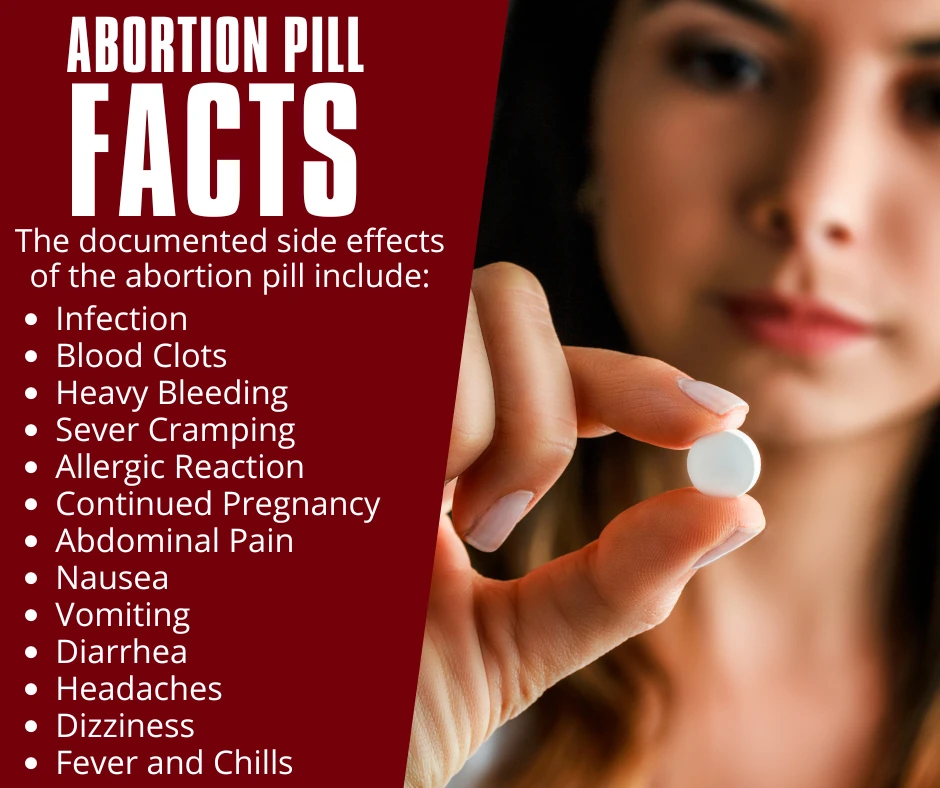
South Carolina Abortion Pill Information

Abortion Pill
The abortion pill is a medical abortion. This type of abortion uses two drugs. The first medication (Mifepristone ) blocks the progesterone hormone which is needed for pregnancy to continue. When used together with the second medication (Misoprostol), it will end an early pregnancy (70 days or less since the first day of the last menstrual period or 10 wks LMP) and is considered unsafe beyond that time.
The pill, mifepristone, causes an abortion by blocking the hormone progesterone, which is necessary for pregnancy to continue. The abortion pill is administered in three doses, along with another drug, misoprostol, and typically requires three clinic visits.
On the first visit, the woman takes three mifepristone abortion pills, which results in the death of the fetus.
On Day 3, she takes the second abortion pill, misoprostol, which will cause cramping to expel the fetus.
A follow-up visit is required two weeks after taking the abortion pill to ensure that the pregnancy has terminated. If an ultrasound scan shows that the fetus has not been expelled, a surgical abortion will be required, typically at an additional cost.
Other names for the abortion pill (Ru486):
Mifepristone is the generic name for RU-486. In the U.S., RU486 is sold under the brand names Mifeprex® and Early Option®.
The abortion pill involves two drugs:
When taken alone, RU486 results in a complete abortion only about 60% of the time. A second drug, a prostaglandin, is given 48 hours later to increase the abortion pill’s effectiveness. The prostaglandin causes uterine contractions to help expel the fetus. Misoprostol (brand name Cytotec) is the prostaglandin used with RU-486 in the U.S.
In South Carolina the Abortion Pill is now available by mail. Before taking the Abortion Pill or any other medication, get information from a trusted source so that you understand how it works and the possible side effects.
Who Should not take the abortion pill (ru486):
The FDA advises that the Medication abortion pill (RU486) should NOT be taken if any one of the following circumstances apply:
- It has been more than 49 days since your last menstrual period began.
- You have an IUD, which must be removed before taking the pill.
- Your healthcare provider has told you that you have an ectopic pregnancy (a pregnancy outside the uterus). Note: About 2% of pregnancies are ectopic.
- You have problems with your adrenal glands (chronic adrenal failure).
- You take a medicine to thin your blood.
- You have a bleeding problem.
- You take certain steroid medications.
- You cannot return for the necessary follow-up visits (2 days and 14 days after taking RU-486).
- You cannot easily access emergency medical help, including blood transfusions and emergency resuscitation, in the 2 weeks after taking the medication abortion pill.
- You are allergic to mifepristone [RU-486], misoprostol, or medicines that contain misoprostol such as Cytotec or Arthrotec.
Adverse events and side effects of the abortion pill:
In U.S. trials of RU486/misoprostol, at least 99% of patients experienced at least one of the following medication abortion pill side effects:
- Abdominal pain (cramping) (97%)
- Nausea (67%)
- Headache (32%)
- Vomiting (34%)
- Diarrhea (23%)
- Dizziness (12%)
- Fatigue (9%)
- Back pain (9%)
- Uterine hemorrhage (7%)
- Fever (4%)
- Viral infections (4%)
- Vaginitis (4%)
- Rigors (chills/shaking)(3%)
More than one adverse event was reported for most patients. Approximately 23% of the adverse events were judged to be “severe.”
The FDA is aware of women in the United States who died from sepsis (severe illness caused by infection of the bloodstream) after medical abortion with Mifeprex and misoprostol.
Calculating the Length of Pregnancy:
Doctors calculate the length of pregnancy by counting from the first day of the last menstrual period (LMP), approximately two weeks prior to conception (fertilization). So “up to 49 days LMP” means up to 5 weeks after conception.
Understanding the details and implications of choosing the medication abortion pill is crucial for anyone considering this option. It’s important to be fully aware of the time constraints, procedure, potential side effects, and risks involved with this form of abortion. The use of RU486, coupled with misoprostol, is a significant medical decision that should be made with comprehensive knowledge and under professional medical guidance.
For those considering this option, it’s vital to consult with healthcare professionals to ensure safety and to discuss any concerns or questions you might have. It’s equally important to understand the legal and health criteria that determine eligibility for taking the medication abortion pill. Remember, this decision is not just about the immediate termination of pregnancy but also involves considering your long-term health and well-being.
If you or someone you know is facing an unplanned pregnancy and contemplating a medication abortion, consider reaching out to your local South Carolina pregnancy center for detailed information and support. Making an informed decision is essential, and it’s important to have access to all the facts and support systems available. Remember, you are not alone in this journey, and there are resources and people ready to help you through this process.
Abortion Pill Frequently Asked Questions
Question: How Much Does the Abortion Pill Cost?
Answer:
The typical cost of the abortion pill ranges from $350 to $700, and it may be even higher depending on the provider. For the information you need, determine how far along you are in your pregnancy with our complimentary ultrasound services.
Question: How Can I Get the Abortion Pill?
Answer: You can get an abortion pill either through an abortion provider’s clinic or by an online mail source. For mail order, in most cases, a telehealth appointment is required and the medication for the abortion is sent directly to you without an in-person physical examination. A physical examination is important because it dates the pregnancy, rules out ectopic pregnancy, and determines viability (if you are at risk for miscarriage).
Question: What are “Missed Period Pills?
Answer: sed period pill is another name for the abortion pill. Some people may think it might help them psychologically if they’re unsure about abortion. Regardless of its name, you should know that it is an abortion.
South Carolina Pregnancy Centers
South Carolina pregnancy centers are located in all major cities including Charleston, Columbia, North Charleston, Mount Pleasant, Rock Hill, Greenville, Summerville, Goose Creek, Greer, Sumter, and even many smaller cities.
Most South Carolina pregnancy centers listed offer free and confidential services including medical grade pregnancy tests and ultrasound exams.
Life Choices Pregnancy Care Center
130 E. Pine Log Road
Aiken, SC 29803
803-649-9890
Anderson Crisis Pregnancy Ctr
1303 N. Murray Ave
Anderson, SC 29623
864-231-0077
Radiance Women's Center
21 Marshellen Drive
Beaufort, SC 29901
843-525-0300
Dazz Pregnancy & Sexual Health Center
1106 B St. Andrews Blvd, Suite B
Charleston, SC 29407
843-225-3010
Lowcountry Crisis Pregnancy Ctr
7481 Northside Drive
Charleston, SC 29420
843-553-3505
Foothills Crisis Pregnancy Center
518 College Ave Suite 170
Clemson, SC 29631
864-654-6200
Daybreak LifeCare Center
1601 St. Julian Place
Columbia, SC 29204
803-771-6634
Daybreak Crisis Pregnancy Center
207 Main Street
Columbia, SC 29204
803-771-6634
Hope Women' s Center
879 Gentry Memorial Hwy
Easley, SC 29641
864-855-8500
A Choice to Make PRC
516 S. Coit Street
Florence, SC 29502
843-669-4673
Cherokee Pregnancy Center
1719 Old Georgia Highway
Gaffney, SC 29342
864-489-9939
Crossroads Pregnancy Center
428 Grace Street
Greenwood, SC 29649
864-223-1147
Piedmont Women's Center
100 Collins Drive
Greer, SC 29651
864-271-0100
Pregnancy Center and Clinic
1 Cardinal Rd. Suite 1 & 2
Hilton Head Island, SC 29926
843-689-2222
Pregnancy Care Center
19 Moss Creek Village
Hilton Head Island, SC 29926
843-689-2222
Women's Enrichment Center
720 S. Main Street
Lancaster, SC 29721
843-689-2222
LaVie Pregnancy Care Center
1271 Calks Ferry Road
Lexington, SC 29072
803-996-4673
Coastline Women's Center
3926 Wesley St Suite 204
Myrtle Beach, SC 29529
843-877-5653
LifeBridge of SC
1510 Main Street
Newberry, SC 29108
803-276-4788
Dazz Pregnancy & Sexual Health Center
923 Chestnut Street
Orangeburg, SC 29115
803-937-3010
Piedmont Women's Center
108 Commons Blvd
Piedmont, SC 29673
843-689-2222
Piedmont Women's Center
11332 N. Jacob Smart Blvd
Ridgeland, SC 29936
843-689-2222
Foothills Crisis Pregnancy Center
207 Main Street
Seneca, SC 29679
864-882-8796
Carolina Pregnancy Center
7425 Westlake Dr
Spartanburg, SC 29304
864-582-4673
Sumter Pregnancy Center
21 Barnette Dr
Sumter, SC 29151
803-773-8858
The Advocacy Center
190 S. Lafayette Dr.
Sumter, SC 29150
803-774-5600
South Carolina, located in the southeastern United States, is known for its historic charm, beautiful coastal regions, and diverse cultural heritage. Charleston is its largest city and a major cultural and historical center. South Carolina features a varied geography, including sandy beaches along the Atlantic coastline, rolling hills in the Piedmont region, and lush forests. The climate is characterized by hot, humid summers and mild winters. As of 2022, the population of South Carolina is projected to be 5.283 million. Universities in South Carolina include: University of South Carolina, Clemson University, and many other colleges and universities. The capital is Columbia, South Carolina
Frequently Asked Questions
Question: Do I need an appointment?
Answer: Walk-ins are welcome. However, it is best to make an appointment to minimize your office wait time.
Question: What is the cost?
Answer: All services are free and confidential.
Question: What should I expect when I come for my visit?
Answer: Upon your arrival, a friendly receptionist will guide you to meet your client advocate. This advocate will offer you a judgment-free space to talk, followed by essential information and a pregnancy test. In the event of a positive test result, a dedicated medical professional will perform a limited ultrasound to verify the pregnancy's viability and estimate the age of the fetus.
Question: How long after sex does it take for a pregnancy test to work and how accurate is the test?
Answer: Pregnancy tests can be performed 7 to 10 days after conception. A client with a negative result may be invited to return within 2 weeks for a repeat test if she has not had her period.
If you have taken a home pregnancy test, you may want to confirm results with a laboratory-quality test at your local pregnancy center. These pregnancy tests detect HCg levels within 7 to 10 after conception.
Question: Will you tell anyone about my visit?
Answer: Pregnancy centers maintain a rigorous privacy and confidentiality policy. Clients' information is safeguarded against unauthorized disclosure, respecting their right to privacy, except in instances mandated by law. This includes situations necessary for public health, preventing harm to the client or others, or in specific circumstances where the use or disclosure of information is justified without prior consent, such as in cases of abuse reporting or suicide/homicide prevention.
Question: When should I schedule an appointment?
Answer: High-quality, medical-grade pregnancy tests are capable of detecting pregnancy from the first day after your initial missed period. We advise scheduling an appointment if you've missed a period, have any queries related to pregnancy, or suspect that you might be pregnant.
Question: How far along do I have to be to get a free ultrasound?
Answer: After an initial consultation with a client advocate, many pregnancy centers offer on-site ultrasound scans. These limited ultrasounds are conducted by a licensed nurse sonographer or a registered diagnostic medical sonographer (RDMS) and are subsequently reviewed by a licensed physician. The purpose of an ultrasound is to confirm the viability of the pregnancy and to establish the gestational age.
Question: I already know I'm pregnant and I want an abortion, what's next?
Answer: It is advisable to have an ultrasound to confirm the viability of your pregnancy and to ensure it is located within the uterus, as 20% to 25% of pregnancies end in miscarriage. Moreover, the ultrasound helps in determining the stage of your pregnancy, which is essential in making an informed decision about the type of abortion procedure you may consider. Many pregnancy centers offer a limited ultrasound free of charge.








